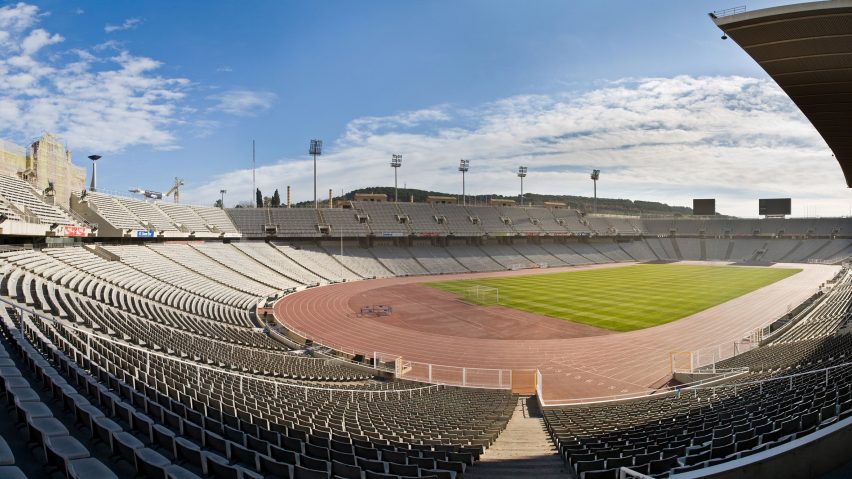Vittorio Gregotti, the Italian architect who designed Palermo's ZEN neighbourhood and the Barcelona Olympic Stadium, has passed away at the age of 92 from coronavirus.
Gregotti died at the San Giuseppe hospital in Milan on 15 March 2020. His wife is still being treated for Covid-19 at the same hospital.
The architect, who founded his practice Gregotti Associati International in 1974, designed buildings including the 1992 Barcelona Olympic Stadium, Grand Théâtre de Provence in Aix-en-Provence, the Arcimboldi Opera Theatre in Milan, Lisbon's Belém Cultural Centre and the Università Bicocca in Milan.
Italy's minister of culture Dario Franceschini mourned Gregotti's passing, describing him as "a great Italian architect and urban planner who has given prestige to our country in the world".
Pirelli CEO Tronchetti Provera said: "With Vittorio Gregotti one of the great protagonists of twentieth-century architecture disappears, who has also contributed to changing the face of Milan, projecting it into an international dimension."
In 1975 Gregotti curated an exhibition on architecture for La Biennale di Venezia, laying the foundations for the establishment of the Venice Architecture Biennale in 1980.
"I agreed to do it only if we also had a small first exhibition of architecture," Gregotti said in an interview on the origins of the architecture festival.
"If not, well, I wasn't going to do it. The biennale had never had an architecture section, so this would be the first one."
That year he produced an exhibition on the abandoned grain mills on the island of Giudecca in Venice. The next year Gregotti was made director of the biennale's visual arts section. He used the role to expand the festival's focus on architecture further by putting on more venues with more architecture and design exhibitions.
In 1978, as director of the Venice Biennale, he chose the theme Utopia and the Crisis of Anti-Nature: Architectural Intentions in Italy.
Born in Novara in 1927, Gregotti started working at his father's textile factory at the age of 14. From this early experience, his interest in worker's rights and the collective interest led to him becoming a member of the Italian Communist Party.
He pursued architecture following a visit in 1947 to the Paris studio of French architect Auguste Perret and his brothers. Back in Italy he studied at the Politecnico di Milano.
From 1955 to 1963 he was editor-in-chief of Italian architecture magazine Casabella.
A Palermo housing estate by Gregotti starred in 1990 film Ragazzi Fuori
One of his most controversial urban plans was the Zona Espansione Nord, or ZEN, in Palermo.
Built in 1969, Gregotti's multi-storey housing for 10,000 people in an economically deprived area has become run down, and is now synonymous with poverty and crime – so much so that director Marco Risi used it as the setting for his 1990 film Ragazzi Fuori, or Boys on the Outside.
In 2008 a secret Mafia firing range was discovered underneath it. Mobster Salvatore Lo Piccolo built a warren of tunnels under the housing state, including a sound-proofed 10-metre-long firing range and an air-conditioned hiding place stocked with a TV and cash.
More successful was Gregotti Associati International's renovation of a stadium for the 1992 Barcelona Olympics, the Estadi Olímpic Lluís Companys. Gregotti gutted the structure, which had been originally built by architect Pere Domènech i Roura for the 1929 Expo. The facade was retained and new grandstands added to give it a capacity of 67,007 seats.
It has remained in use ever since.
In 1998 he built the Università Bicocca in Milan in an industrial area that was originally the Pirelli industrial complex. The critical reception of the campus was mixed, with some critics complaining that it failed to make the area a cultural centre.
His studio has a strong focus on urban planning, designing an entire town in China – Pujiang New Town in Shanghai, which includes piazzas, a bell tower and Venice-style canals.
A principal figure in the Italian neo-avant garde movement, Gregotti was also a respected architectural theorist. He focused on examining the modernist and post modernist movements of the 20th century,
He published many books, including Inside Architecture, which examined the theoretical debates on modernism and how mass culture has negatively impacted the environment.
His 2008 book Contro la fine dell’architettura, or Against the end of architecture, explored the question of the discipline's social responsibility.
Milan, where Gregotti died, is currently on lockdown due to the coronavirus. The virus has spread to over 100 countries and 6,500 people have lost their lives.
Main image is by Diliff.

